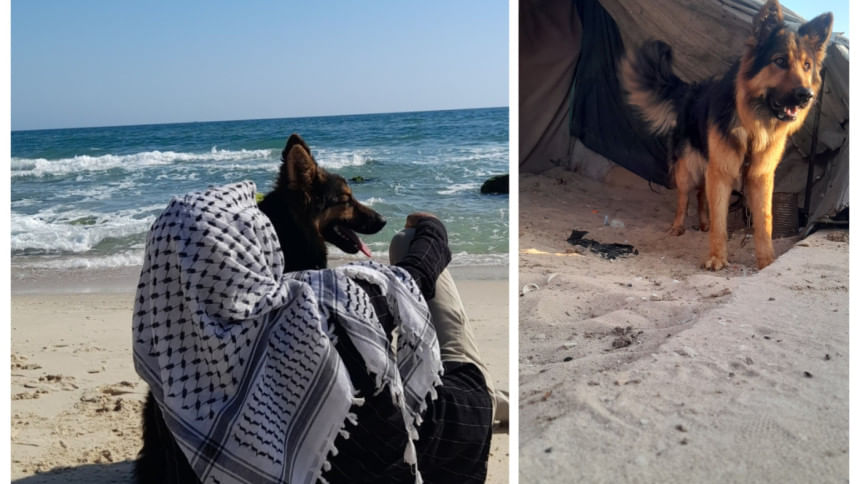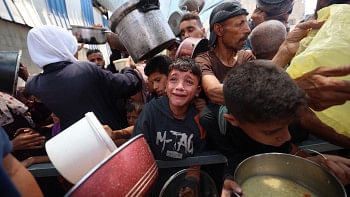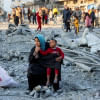Dogs in Gaza and the conditioning of the Western mind

I recently came across a video about Hamed Ashour and his German Shepherd dog in Gaza, and the more I reflected on it, the more the subject intrigued me. In my writing on the Israeli genocide, animals have often emerged as part of Gaza's unfolding horror, whether in Gaza: The Donkey and the Fate of Western Civilization, or in scenes of famished dogs feeding on the bodies of dead humans scattered along Gaza's desolate streets.
Like the 50,000 children killed, starved or maimed in Gaza, animals too, domesticated or otherwise, became victims of the Israeli genocide. In the dictionary of Israeli war euphemisms, they were all dismissed as mere "collateral damage." Children were buried beneath the rubble of their homes—some dead, others still alive. Dogs, too, were trapped under the debris, as seen in this video.
As you can see, in those moments, humans and animals alike share the same desperate moans, gasps for breath, and an instinctive urge to survive.
One thing is certain: the emaciated dogs that remained in Gaza fared better than those that escaped into nearby Jewish-only colonies. Even with the man-made starvation, Gaza's dogs survived. Their "aggressive" siblings, however, those that infiltrated "the western Negev region from Gaza," were not so fortunate. They were deemed a threat by the Israelis and euthanised.
Back to the German Shepherd in Gaza. Ashour reposted on his Facebook page a story he had originally shared a year earlier about "a kind, loyal dog who became my companion." Together, they endured the Israeli bombing and shared canned food delivered by UN agencies before Benjamin Netanyahu broke the ceasefire and reimposed a total siege last March.
This story took me back to a moment from my childhood growing up in Nahr el Bared Palestinian refugee camp. I learned then how much humans and dogs have in common. It was September 1972, when American-made Israeli fighter jets bombed an area at the edge of our refugee camp. In the raided area, next to the camp's dump site, there were small farms bordered by thick hedges. There, among the refuse, were meat scraps and bones discarded by local butchers.
Naturally, the free-ranging dogs took shelter in dens beneath the thick brush near the dump site, coming out at night to scavenge for discarded bones and entrails. I know this because we used to chase the dogs off the bones, which we gathered into a pile and sold for less than a quarter of a dollar to a man who came every Friday, riding a mule-drawn cart.
Following the Israeli air raid in the very area where these stray dogs lived, the survivors scattered inside the alleys of the camp, seeking shelter. Their tails tucked tightly between their hind legs, they moved cautiously, heads lowered, as if pleading for a safer place to hide. Watching them, I was struck by a vivid embodiment of a proverb my late grandmother and mother used to repeat when describing someone gripped by fear: "He walked away with his tail tucked between his legs." That moment offered a real-life lesson, not just in language, but in the universal impact of fear, even on animals.
Like Ashour welcoming the German Shepherd in Gaza, my friends and I did not see the dogs as rivals competing for bones, but as fellow living souls confronting the same inhumanity. Our shared instinct for survival took precedence. For weeks, the stray dogs found refuge in the narrow alleys, taking shelter beside us. Only when the danger began to fade did they retreat to their dens in the thick hedges, and we returned to chasing bones, as if life had somehow returned to normal.
Beyond the symbolism of a tail tucked between their legs, I came to appreciate the emotional bonds between humans and dogs when I had my first German Shepherd in the camp. That loyal companion taught me that even in adversity, trust and connection could still survive all hardships.
Now in Gaza, the story of the dog made headlines in the international press. The dog news was translated into seven languages and read by five million people. Ashour received calls from animal rights organisations checking on the dog's well-being, and requested a photo of the dog and the tent they shared.
The response to the photo was overwhelming, filled with deep sympathy and concern for the dog. Ironically, there was little attention given to the human who saved him. The person who shared his scarce UN-issued canned food was little more than a nuisance in the German Shepherd's story of suffering and survival.
Why am I not surprised by this reaction?
In a world desensitised to Palestinian torment, the erasure of the dog's Palestinian companion is not an anomaly, but a reflection of something far more profound. It is the product of a sophisticated Zionist-influencing cabal, well before October 7, in which Israel's hasbara arms— Hollywood and Western media—have normalised and internalised the dehumanisation of Palestinians. The soft conditioning of the Western mind has made it easy to white-out the Palestinians from the frame. Ashour wasn't the only one invisible in the picture; it's the injustice and collective suffering of Palestinians that have been erased from view for 77 years.
Decades of systematic portrayals of Palestinians in Western media and Hollywood have subtly shaped public perception and distorted objective reasoning. This deeply embedded, unconscious bias breeds a form of casual, almost reflexive racism, even among those who consider themselves fair-minded or empathetic. More insidiously, it conditions the Western mind to internalise racist narratives, hidden in entertainment or news, and accept them as true, unquestioned.
There is nothing inherently wrong with showing compassion for a dog or recognising it as an innocent victim of circumstance. But would Europeans ever accept that Palestinians, too, are victims of circumstances born from a European problem that evolved into a settler-colonial project on their land? A problem that uprooted Palestinians and transplanted Europe's creation onto their soil.
Who knows, perhaps by now, Ashour and his dog are down to sharing a single can of food every other day. Yet, from what I know about dogs, if this German Shepherd were given the choice between fleeing to safety and comfort in Europe, or staying by the side of the man who saved him under Israeli blockade, starvation and bombardment, this dog would choose to stay. Because, unlike humans, dogs don't feign compassion or fake empathy. Their loyalty is instinctive, not conditioned.
The article was first published on The Palestine Chronicle (August 19, 2025) and Middle East Monitor (August 18, 2025).
Jamal Kanj is the author of Children of Catastrophe: Journey from a Palestinian Refugee Camp to America, and other books. He writes frequently on Arab world issues.
Views expressed in this article are the author's own.
Follow The Daily Star Opinion on Facebook for the latest opinions, commentaries and analyses by experts and professionals. To contribute your article or letter to The Daily Star Opinion, see our guidelines for submission.

 For all latest news, follow The Daily Star's Google News channel.
For all latest news, follow The Daily Star's Google News channel. 










Comments